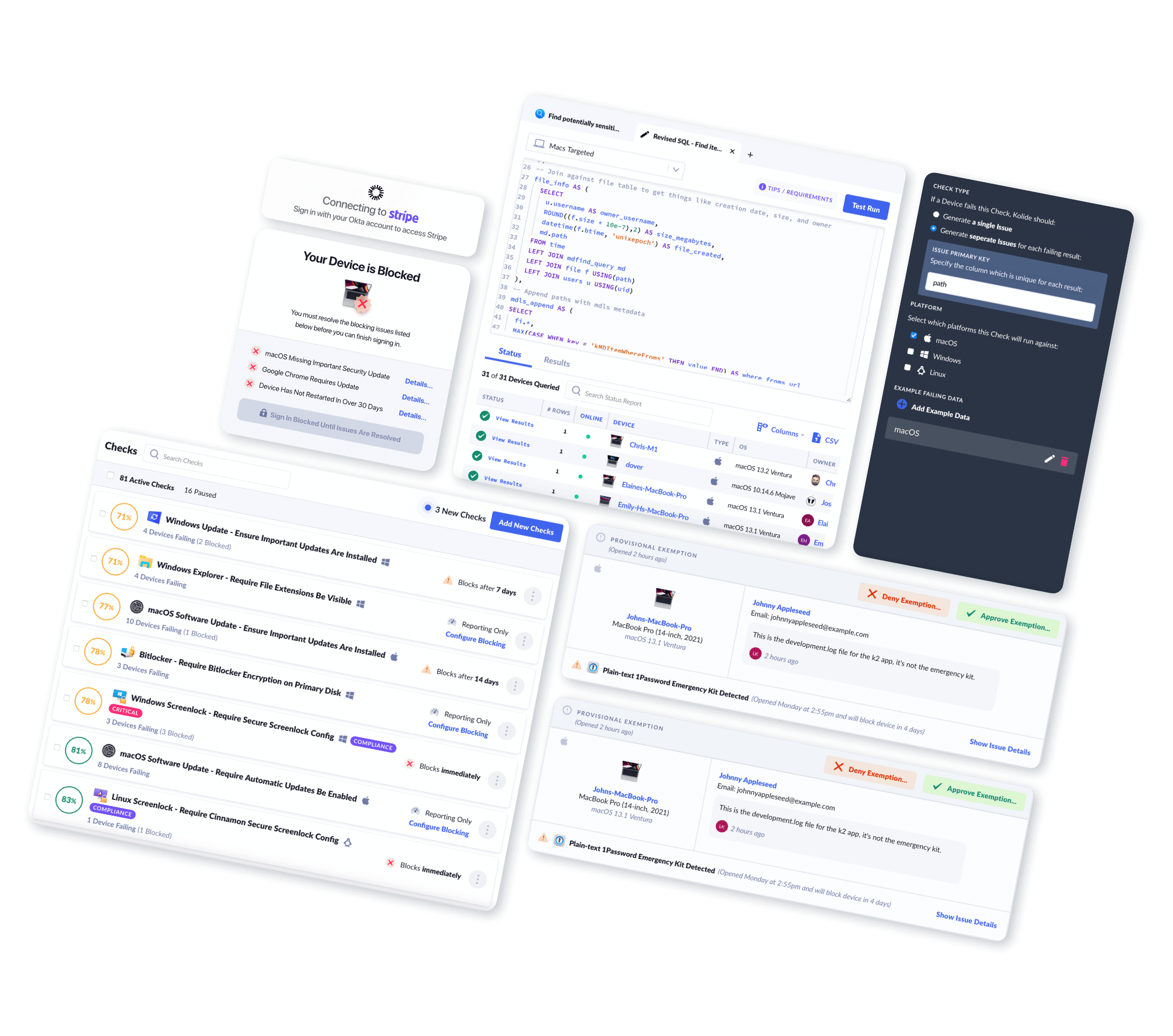How to List Defender Threat Detections Across All Windows Devices
Using Kolide, you can easily view and query Windows Defender Threat Detections across your fleet.
Introduction
Windows Defender is the name for the built-in antivirus software that comes with Windows. It can serve as either a full antivirus and anti-malware service or it can augment commercial antivirus software that is installed on the device.
If a Windows Defender Antivirus scan detects a threat (ex: malware) information about that threat is enumerated and stored on the device. This device property collects and aggregates these threat detections.
What Windows Defender Threat Detection Data Can Kolide Collect?
Kolide's endpoint agent bundles in osquery to efficiently collect Windows Defender Threat Detections from Windows devices in your fleet. Once collected, Kolide will parse, clean up, and centrally store this data in Inventory for your team to view, query, or export via API.
Kolide meticulously documents every piece of data returned so you can understand the results.
Windows Defender Threat Detections Schema
| Column | Type | Description | |
|---|---|---|---|
| id | Primary Key |
Unique identifier for the object |
|
| device_id | Foreign Key |
Device associated with the entry |
|
| device_name | Text |
Display name of the device associated with the entry |
|
| action_success | Boolean |
Was the action Windows Defender took in response to the threat successful? |
|
| additional_actions | Enum::Text |
Information about the current running state or future activation potential of the threat Can be one of the following:
|
|
| am_product_version | Text |
The version of the Antimalware portion of Windows Defender |
|
| am_product_version_major | Bigint |
|
|
| am_product_version_minor | Bigint |
|
|
| am_product_version_patch | Bigint |
|
|
| am_product_version_subpatch | Bigint |
|
|
| cleaning_action_id | Integer |
The cleaning action taken by Windows Defender. Note on data collection: This value is an enum, but Microsoft has not documented what the values currently represent. |
|
| current_threat_execution_status_id | Enum::Text |
Information about the current running state or future activation potential of the threat Can be one of the following:
|
|
| detection_id | Text |
A unique identifier associated with each threat detection |
|
| detection_source_type_id | Enum::Text |
The method used to detect the threat Can be one of the following:
|
|
| domain_user | Text |
The user associated with the scan or who requested remediation |
|
| initially_detected_at | Timestamp |
The initial threat detection time |
|
| process_name | Text |
The name of the process involved (otherwise |
|
| remediated_at | Timestamp |
The time of the remediation |
|
| resources | Text[] |
List of resources affected by the detection (ex: files) |
|
| threat_id | Bigint |
A unique identifier associated with the threat discovered (eg. |
|
| threat_status_changed_at | Timestamp |
The most recent time of the threat status change |
|
| threat_status_error_code | Bigint |
Windows Defender threat error codes in decimal notation (eg. |
|
| threat_status_id | Enum::Text |
Information about the current running state or future activation potential of the threat Can be one of the following:
|
|
| collected_at | Timestamp |
Time the row of data was first collected in the database |
|
| updated_at | Timestamp |
Time the row of data was last changed in the database |
|
Why Should I Collect Windows Defender Threat Detections?
IT & Security administrators may review this information to discover confirmed malware that may have been downloaded and executed on a device.
End-User Privacy Consideration
Kolide practices Honest Security. We believe that data should be collected from end-user devices transparently and with privacy in mind.
Windows Defender Threat Detections can contain references to full path of the file (or files) associated with any discovered threat and the name of the user associated with the antivirus scan.
While administrators are unable to enumerate the contents of any files, the names themselves could contain sensitive information. See the example data collected to get a representative idea of what information is shared with administrators.
When you use Kolide to list Windows Defender Threat Detection data from end-user devices, Kolide gives the people using those devices insight into exactly what data is collected, the privacy implications, and who on the IT team can see the data. This all happens in our end-user privacy center which can be accessed directly by employees.
